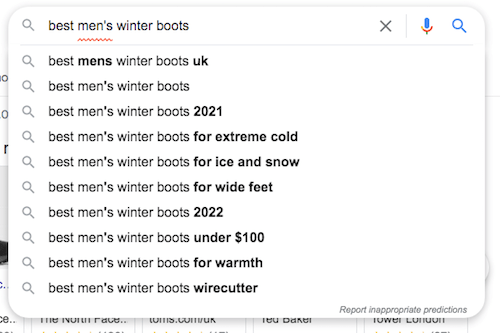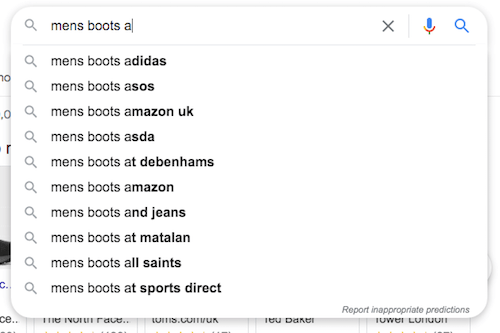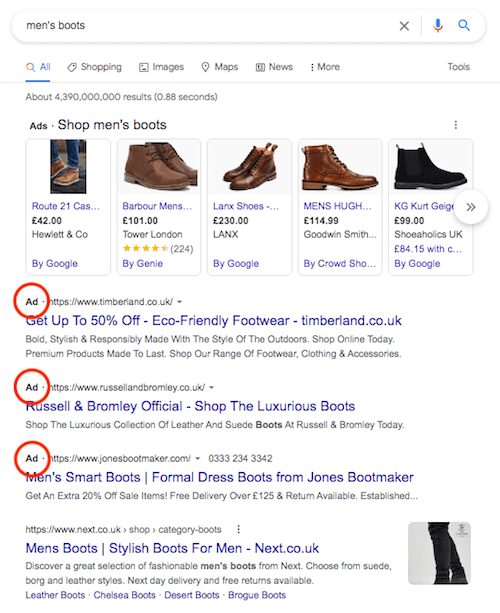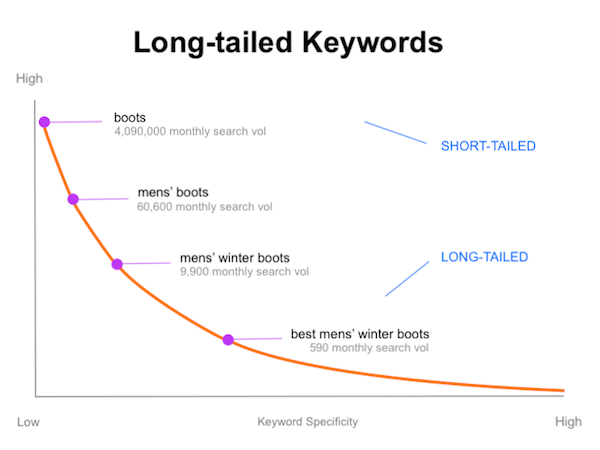Everyone wants their web page to appear first on Google search results, or at least on the first page of Google. Knowing how to do keyword research is a vital step in trying to achieve that. This article will show you the fundamental principles of how to do keyword research, including free and paid tools that can help.
The focus here is on Google because it is by far the most used by searchers, however the same applies to Bing and other platforms.
TABLE OF CONTENTS
WHAT IS KEYWORD RESEARCH?
Keyword research is part of Search Engine Optimization (SEO), which is the process of making a website look attractive to search engines so that they rank it higher, faster, in search engine results pages (SERPs).
Keywords are the words or phrases people type in to search engines when looking for particular content.
When someone is searching to buy a pair of boots, and types, for example, “men's hiking boots” in Google search, they expect the results to return details about... well..... men's hiking boots. They don't want to see for example a list of florists' details. So keywords are used in web page to communicate to search engines what the content is about, so that search engines they know when it's suitable to show that content in organic search results.
Keyword research is the process of identifying the most appropriate words or phrases to represent the topic of the web page. It needs to be done for every page on your website, each of which will generally be targeting a different but related keyword term.
Business pages will tend to have limited options for keyword use, and there are some different rules for Local SEO for local businesses too, but blog posts are perfect for targeting keywords across the different topic possibilities within your niche for any business.
WHY KEYWORD RESEARCH IS IMPORTANT
Keyword research is important because by understanding what people are searching for, you can target your content and your marketing efforts in a more relevant and effective way.
INCREASE TRAFFIC
Targeting specific keywords can increase the organic traffic to your website through increased relevance for your target audience. It can improve your site’s visibility and ranking in search engine results and help your site to be shown to the people who are looking for exactly what you offer.
GENERATE MORE LEADS & SALES
The right keywords will attract the right visitors. Correct targeting will generally generate more high-quality leads which can convert to more sales.
OPTIMISE ADS BUDGET
By knowing which terms customers might use when searching for products or services, you can create targeted advertising campaigns that appeal to them specifically. This should result in a greater rate of return on your ad spend.
HOW TO DO KEYWORD RESEARCH
One of the biggest failures in keyword research is the lack of understanding about what users are looking for. Too often, businesses only focus on their own needs, ideas and goals when researching keywords.
To be successful with your SEO strategy and online marketing campaigns, you need to do extensive keyword research that puts your target audience’s wants and needs at the forefront. You also need to conduct qualitative and quantitative analysis of potential search terms to determine which ones have the highest potential for generating the most leads or sales.
The first step is to start by making a long list of keywords and related terms.
BRAINSTORM KEYWORD IDEAS
Have a big brain dump of all the possible words you can think of that might be relevant. What terms do you think people would be using to find the type of content you are offering? Put yourself in their shoes. If you didn't know anything about the topic, what words would you use? Think of related keywords similar in meaning or synonyms. Consider the keywords you think you should be ranking for and would want to rank for.
FIND 'SEED' KEYWORDS
Identify general, broad term words. Seed keywords are the main topic of your web page - the most general and unspecific term. Going with the previous example, “boots” or “men's boots” would be seed keywords.
AUTOCOMPLETE SUGGESTIONS
Let the search engines do the work for you. Autocomplete is a function in search engines as well as other sites such as Amazon and YouTube which offers a great way to find out what people are searching for. Type your keyword into the search bar and as you type you will see that it gives you predictive suggestions of how you might complete your search term. These indicate popular searches and can be useful for keyword ideas.

Take this one step further and enter your keyword then a space then the letter “a” (no quote marks), and you'll get a whole new lot of different suggestions in the drop down. Then swap out the “a” for letter “b” and you'll get different suggestions again, and so on through the alphabet. Similarly precede your keyword with a letter for additional suggestions.

COMPETITOR KEYWORD RESEARCH
Competing websites are a great resource for finding keywords. Do a search with some of your seed keywords and look through the top SERPs pages. Look at the titles, meta descriptions, and the web pages themselves, to see what words or phrases are being used and targeted. Rather than doing it manually which can be time consuming a number of the keyword research tools mentioned below will give you this information easily and quickly.
CHECK THE ADS
Ads cost money so a lot of effort and research will have gone into the effectiveness of the words being used in ads and the content of the associated web page. Look for the keywords being targeted in ads and digital marketing around your topic or niche.

CONSIDER SEASON/TRENDS/LOCATION
If your content is suitable, consider seasonal trends (e.g. winter travel), location specific keywords (e.g. estate agents in London). Use Google Trends to give you an idea of the trend of the keyword, whether it's trending up or down, high or low.
THINK OUT OF THE BOX
Look for keywords in less obvious places, for example trade publications, directory websites, magazines, catalogues, social media, search Google Images, Reddit, Quora and other forums, Amazon, Ebay, and all the less conventional places you can think of that might offer more keywords on your particular niche.
HOW TO SELECT THE BEST KEYWORDS FOR YOUR SITE
Once you have a long list of potential keyword phrases, it’s time to decide which ones are most appropriate for your web page, to narrow the list down.
WHAT TERMS ARE PEOPLE SEARCHING
The number one rule for choosing keywords is there has to be search volume for the keyword. That's the metrics for the number of search queries made per month for that particular search term.
There's absolutely no point creating the most wonderful piece of content if there is no searcher looking for it, and so no one will never see it. Recent research done by Ahrefs found that over 90% of web pages are never visited.
It can't be stressed enough that your keywords need to have relevance and a reasonable amount of search volume.
Commonly, broad terms have more search volume. For example a broad term like 'men's boots' will have more searches than 'men's black leather Chelsea boots'. More specific and longer keywords are known as long-tail keywords. Broad term keywords, also known as short tailed or head keywords, generally contain 1 or 2 words where as long-tail keywords contain 3 or more words in the phrase.
There are keyword tools which will give you search volume details, as will other general SEO tools - see suggestions below.

KEYWORD COMPETITION & KEYWORD DIFFICULTY
When you’re deciding on keywords, you need to also consider how difficult it will be to rank for that keyword. This will depend on the competition, meaning how many other web pages and websites are also targeting that keyword. The greater the competition, the harder it is likely be for you to rank for that keyword. The higher the authority of the competing sites the harder still to compete against them, especially if your site is quite new.
Again, broad term keywords tend to have more competition, with long tail keywords having less competition.
For ads, the keyword difficulty also affects its bid cost. A harder to rank keyword will generally have a high bid price which will make it more expensive to run an ad campaign than a keyword that is easier to rank.
A number of the tools listed below offer indications on keyword competition and keyword difficulty. However if you're looking to quickly check one or two keywords you can do this natively in Google search. In the search box type in 'allintitle:your keyword' (without quote marks), for example 'allintitle:mens leather boots'. This will return how many web pages have that keyword in their title, which gives a strong indication that they are targeting that keyword.

Similarly you can also check allinrul:your keyword for further data when choosing keywords.

SEARCH INTENT
When you’re thinking about choosing keywords, it’s also important to consider the intent behind the keywords. For example if you are trying to sell a product you want to target words with buyer intent.
The buyer journey typically begins with information gathering before committing to buy. So if someone searches for a review they are typically still gathering information. If they search for a particular model number of a product they are likely to be closer to making a purchase decision.
You will therefore want to choose different keywords on a product page than for an informational blog post, as the user intent is different. That doesn't mean that blog posts can't sell - they can draw in visitors looking for information and based on the strength of the content visitors may be converted into customers, but this is less common.
KEYWORD RESEARCH TOOLS
To get the most out of your keyword list you'll want to use actual data to decide what the best keywords to use are.
Things like keyword search volume and keyword difficulty can be found using tools. There are many free keyword research tools, and for more advanced needs there are also paid ones. The following are some of the best keyword research tools.
Google Keyword Planner
The keyword tool provided by Google is free and is meant for use to research and set up a Google Ads campaign so it offers information such as the Cost Per Click (CPC), also known as Price per Click (PPC), and competition difficulty. It also has a location setting to pinpoint data from a particular area.
The search volume is given in rough ranges until you run an ad campaign, but this can be as low as a few pounds, and once unlocked exact search volume info is always available to you.
The tool also allows you to submit a competitors' website or web page url to get the keywords that that page or site is ranking for.
Google Trends
Already mentioned, this tool allows you to see how keywords are trending over time on Google. Use the trend lines to help determine if a keyword is becoming more popular or not.
Answer The Public
An unusual format, Answer The Public provides long-tail keywords related to your niche and seed keywords using prepositions, questions and comparisons. It's free and great for your initial brainstorming, and if your browser is hooked up to Keywords Everywhere, a paid keyword tool, it can also give you search volume.
Keyword Surfer
This is a free Chrome extension which allows you to get the search volume right in your Google results page. It's a great keyword tool if you want to do a quick search on just a few keywords.

MozBar
Another free Chrome extension, Mozbar shows the Domain Authority (DA) and Page Authority (PA) for SERP results as well as the number of backlinks each has.
Simply do a search of the term you are interested in, and the data will be available under each SERP listing.
Pages with high DA, PA and many backlinks are considered stronger sites with greater reputation and will be harder to compete against. If your site is quite new, or has a low DA try to avoid competing for keywords with mostly high DAs in the SEPRs results, unless the PA is very low and you believe your content is more appropriate and thorough.

SEMrush
This is an all-in-one paid tool which offers a full range of SEO data gathering information and is used by many SEO professionals. It has an extensive keyword research functionality which breaks down search volume, competition, has a SERPs tracker, and a lot more other data.
Ahrefs
Like SEMrush this is also an all-in-one paid tool which offers extensive SEO data gathering capabilities and is used by professionals. It also offers keyword research, tracking tools, search volume, SERPs info, competitor rankings, plus a lot more.
KEYWORD USE
So you've gone through the SEO keyword research process and have the data on your keyword search terms.
Some of your proposed keywords will have fallen by the wayside because they have no search volume or because competition is very high. Others of your proposed keywords will be standing out as good potentials.
What you're looking for is a keyword with high search volume and low competition, the competition ideally coming from sites and pages with low DA and PA. I tend to think of keyword research as the modern day equivalent of gold prospecting in the gold rush, and looking for that golden nugget.
You want to choose one main keyword to target and another 3 or 4 secondary keywords which are related or similar terms.
Once you have selected the best keywords for your website, it's time to create some effective content around them!
Where you place keywords is important because search engines look in certain places.
Use your main keyword:
- in your web page title (appears on the page tab that is at the top of the page window)
- in your main heading
- in another sub heading somewhere in the article
- in your first sentence as close to the beginning as possible
- in the last 100 words at the end of your article
- included in the content at a ratio of about 5%, it's not a good idea to overdo it or Google may penalise your for keyword stuffing
- in image titles
- in image alt text
- in links to appropriate content
- in page meta descriptions
- in the page url
Use secondary keywords in headings, throughout the content, in links if appropriate, and in image titles and alt text.
ADVANCED KEYWORD RESEARCH
There are a few additional things you can do to help boost your website's SEO through your keyword strategy.
CREATE A CUSTOM PERSONA
A customer persona is a person or group of people who represent the target market for your product or content. It is a well known marketing strategy and relevant in digital marketing too. By understanding your customer’s needs and wants, you can create the type of content that is relevant to them.
When conducting keyword research, it's important to identify the specific demographics that make up your customer persona. This will help you tailor your keywords accordingly, ensuring that you're targeting the right individuals with your content and advertising efforts.
Some common characteristics of a customer persona include: age range, gender, income level, education level, location.
Recognising the pain points your customer persona has can help pin point your keywords more effectively.
KEYWORD CLUSTERS
When doing keyword research using tools, many offer an option to cluster keywords. This is the process of identifying from a list of returned keywords which of the keywords should be used together in an article for maximum benefit.
NLP TERMS IN CONTENT CREATION
Google is increasingly able to understand and parse relationships between words and patterns in speech. This is known as NLP or Natural Language Processing, and can be seen in action if you type in a search “apple”. Google knows to return information related to the product as well as the fruit, and most likely Steve Jobs info too.
In order to find NLP terms related to your keyword it's possible to use tools to extract Google's understanding and classification of them. These tools crawl the top ranking pages and find words common to the topic which it is believed Google is looking for in content on that topic. There are many tools to help with this, such as Scalenut.
BUILD A KEYWORD SILO
Keyword silos, also known as SEO silos, allow you to rank for more keywords by creating a strategic linking structure throughout your website based on the core topics.
For example, if your website is about dog obedience, you will likely have a core web page dedicated to targeting that particular keyword. To set up a silo you would also create web pages targeting keywords such as dog training, guard dog training, puppy training, off leash dog obedience, and so on. These pages should then be linked to the core page and to each other. Link building throughout your website in this way will create a strategic keyword silo that is specifically geared towards ranking for keywords related to dog obedience.
Keyword silos help reinforce Google's understanding of your website content and will help your site rank more readily for your niche topic.
KEYWORD RESEARCH FOR EXISTING WEBSITES
For existing websites, analytics tools like Google Analytics and Google Search Console can provide useful data such as the keywords you are already ranking for and the position, so you can create more similar content, or to allow you to optimize the content further so it can rank higher.
FINAL THOUGHTS
As an overview, the primary purpose of keyword research is to determine which words or phrases are most important and beneficial for achieving success with your online marketing campaigns, whether through content creation or paid ads.
Google ranking algorithms are a well-guarded secret and are constantly changing, and there is no guarantee that you will rank on the first page for a keyword, however knowing how to do keyword research and having a good keyword strategy can help improve your odds of success and attract more of the right potential customers.
How To Do Keyword Research Feb 2022



